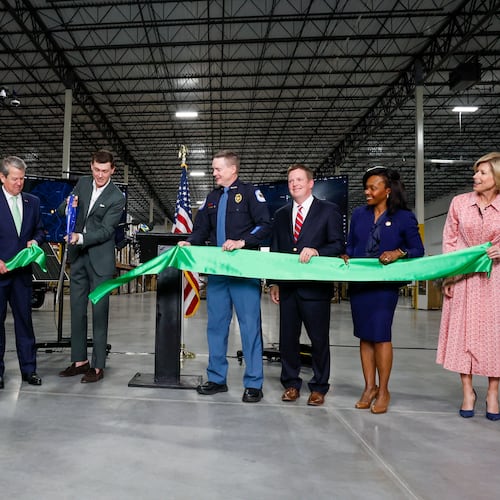For right now, in the wild race for Georgia governor, both candidates say they support efforts to bring Amazon’s second headquarters to Atlanta.
And that's important, business and government officials familiar with the state's recruitment of the e-commerce giant said. Because Georgia, which stands to gain up to 50,000 jobs, must speak with one voice.
Brian Kemp, the newly minted GOP nominee, said during a party unity rally Thursday night he won't try to politicize the high-stakes negotiations. He said he's content to let Gov. Nathan Deal lead talks with Amazon.
“I committed to him tonight that I understand there’s only one governor at a time,” Kemp said.
Democratic gubernatorial candidate Stacey Abrams said she's broadly supportive of offering incentives to Amazon — as long as communities around the future campus also benefit.
Already, Georgia is offering the biggest incentive package in state history, according to Deal, and officials could have to sweeten the pot even more.
Deal has promised to call a special session to sort out an incentive package if Atlanta makes the cut of top finalists, possibly later this year.
The pursuit of Amazon HQ2 has threatened to complicate elections in about a dozen states, and Georgia is no exception. Some observers have express fear that election-year politics could weigh on Georgia’s negotiations and that debates over contentious social issues could make Georgia less attractive.
Roger Tutterow, a Kennesaw State University economics professor, said it would be the right call for the state for the nominees to let Deal handle negotiations without looking over his shoulder.
“Gov. Deal is still the governor, and he has a long track record of great economic development wins,” Tutterow said. “He has an economic development department that has been successful in his two terms in recruiting more business to Georgia.”
But there could be pressure on the candidates. Critics of taxpayer-funded perks for big business fear the winning locale might never see all of the benefits as the state woos one of the world’s richest companies.
Georgia’s bid, shrouded in secrecy under state law, is believed to top $1 billion, including grants, worker training, tax breaks, transportation improvements and other perks. Maryland has crafted an $8.5 billion incentive package, while New Jersey has touted $7 billion in incentives if the e-commerce company picks Newark.
Some incumbents, particularly Republicans, have been wary of offering 10-figure awards to a prosperous Fortune 500 giant during the heat of an election year, while others insist on infrastructure investments and job-training programs as part of any package.
The Seattle-based company has said it will select the winning city by the end of the year. But many observers expect Amazon to soon narrow its current shortlist of 20 communities to a more manageable size.
Kemp, who is Georgia's secretary of state, said he was briefed by Deal on the state's Olympics-like pursuit of the $5 billion campus.
“I’m going to look at anything we’re doing, but I don’t have any control as secretary of state what they’re voting on in the Legislature, whether they’re calling a special session,” he said. “I trust the governor and the Department of Economic Development to put our best foot forward and make sure we’re getting a good return on our investment.”
On the stump, Kemp has not ruled out high-dollar tax breaks for Amazon, but he’s said he wants to review every tax incentive and repeal those that don’t “create more economic opportunity than it costs.”
Abrams has called for a “smart combination of tax incentives and purposeful investment” to lure the headquarters project.
She said at a Friday campaign stop that lawmakers should look no further than the state’s film tax credit, which has turned Georgia into a Hollywood hub.
“I think Amazon bringing 50,000 high-paying jobs to Georgia is a wonderful thing,” Abrams said. “But we have to make certain that any tax incentive packages are smart investments, investments that actually ensure that those jobs are actually high-paying jobs, but also ensure the communities around them benefit from those investments.”
The ongoing debate over social issues could also add a wrinkle into the state's pursuit of the project. Kemp and Abrams made clear this week that a debate over "religious liberty" legislation could be front and center through November.
The federal Religious Freedom Restoration Act provides that government must prove that interfering with a person’s religious practices is the “least restrictive means” of meeting a “compelling governmental interest.”
A state bill, supporters say, could provide protection from heavy-handed government enforcement that tramples on religious expression, but critics say it could legalize discrimination.
Kemp reaffirmed his pledge Thursday to sign the legislation, calling it the "common sense thing to do" and downplayed concerns that it could taint the state's pro-business reputation.
Abrams doubled down on her opposition at a campaign stop Friday.
“Unfortunately, we need protection against divisive rhetoric and horrible legislation like the Religious Freedom and Restoration Act that would restore and legalize discrimination in the state of Georgia,” she said. “We know that has a chilling effect on business and a chilling effect on the economy.”
The legislation has been one of the most polarizing debates in Georgia for years, dividing politicians on a level deeper than party lines. It pits mainstream Republicans against their more conservative cousins, suburban and urban legislators against rural ones.
Supporters say it would protect people of faith from government intrusion, as well as strengthen legal protections for opponents of gay marriage. Opponents point to big-name companies who threatened boycotts if it becomes law.
When Deal vetoed a version in 2016, he was branded a traitor by some grass-roots conservative groups. His top aide, Chris Riley, warned in the run up to this year's legislative session that reigniting the debate would jeopardize the state's hunt for Amazon's second headquarters.
OUR REPORTING
The Atlanta Journal-Constitution has closely followed the hunt for Amazon HQ2, bringing readers details of the state’s bid, evaluating the field of finalists and covering the issues that could come with such a mammoth headquarters. Today, the AJC brings you a report on how the governor’s race could impact Amazon’s choice of city for HQ2.
Keep Reading
The Latest
Featured







